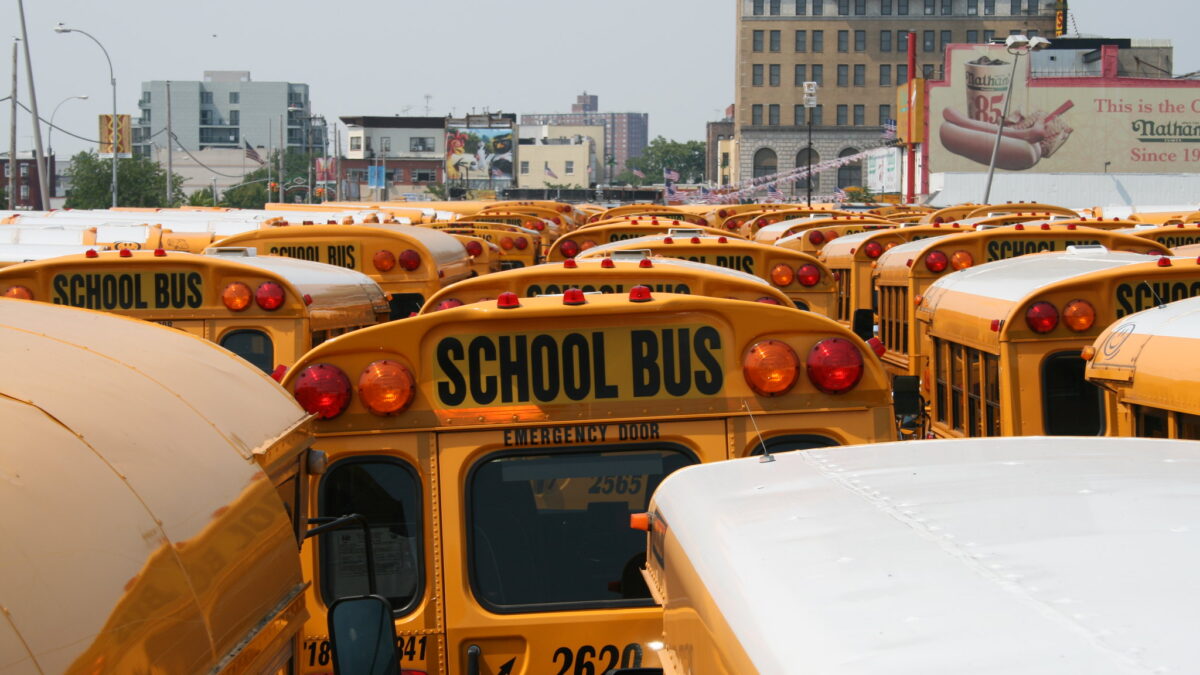
In the past few weeks, media and Hollywood mega-personalities including Bill Maher, George Clooney, and Oprah Winfrey have anointed select teenagers with the smelly oil of celebrity credibility. They’ve determined these kids are uniquely qualified to teach the world which public policies to adopt (i.e., Maher’s, Clooney’s, and Winfrey’s.)
At the moment, the issue is gun control advocacy in the wake of the tragic Parkland shooting. The media is giving loads of airtime to these kids to lead school walk-outs as well as this Saturday’s “March for our Lives” in Washington DC. The march is an extremely well-organized and deeply funded mass mobilization project. It’s probably the biggest mass agitation attempt to abolish the Second Amendment we’ve ever seen.
But the real story is far deeper and broader than a call for gun control advocacy. The real story is how mass public schooling serves mass conformity. It is about how mass schooling deprives countless children of their individuality and the right to think their own thoughts.
These kids know in their gut that to express a politically incorrect opinion is to be cast into social rejection. Mass schooling has operated for generations as the machinery that propels the sort of unthinking, hyper-emotional, obedience to authority, and mass mobilization we see in these kids. Now with schools and media virtually dictating marching orders for them to take part in political protests, it’s reached a tipping point at which parents and all the rest of us have to question and push back on what’s happening.
Today we see heavy media coverage of students being used as political pawns, marching in lockstep for an undebated opinion. Tomorrow we can expect them to be used as fodder to promote any idea blessed by media, Hollywood, and academic elites. The vast majority have never been taught the importance of thinking for themselves or respect for civil debate. Quite the opposite. Mass schooling is not about learning, but about conditioning and programming.
All of the glossy cover stories, TV interviews, and posturing of students granted celebrity status reminds me of point No. 5 in my recent Federalist article on how mass schooling is linked to growing anxiety in youth. There is a sort of pact between school bureaucracies and certain youth “leaders.” The student leaders cue their peers to conform to certain attitudes and behaviors. Refusal will get you socially rejected. That’s a general tenet of mob psychology, as well as mass schooling. An undercurrent of emotional extortion is always present.
Twenty-Something Questions for Independent Thinkers
The use of teens for mass agitation begs a lot of questions. I’ve listed several below. I hope you’ll mull them over, especially if you are a student or a teacher in an alienating public mega-school environment and are not happy there. Whether or not mass schooling has undermined the capacity to process these questions, I think they are worth engaging, simply to exercise the mind.
Why not focus on all forms of school violence, since school homicides are more often the result of beatings or stabbings than shootings? Obviously, mass shootings kill more people at once, but the source is usually the same—an alienated individual who resorts to violence. So why not investigate the causes of all school violence?
Does it strike you as hypocritical to see supporters of the march like Clooney modeling gun violence in the culture? In addition to the casual nature of video game violence, our movies are filled with pop culture icons like Clooney glorifying violence.
Do you believe your school is an emotionally healthy place? Are you aware of the correlation between mass schooling and the spike in mental illness among youth? Do you believe it’s possible that a toxic environment at Parkland actually cultivated the shooter’s pathology rather than mitigated it? (It’s not unusual for kids who are constantly labelled by their peers as “weirdos” to end up reinforcing those behaviors in a sort of self-fulfilling prophecy.) If so, why not promote the idea of “walking up in outreach, instead of walking out”?
Are you aware that the teen suicide rate is on the rise? And that peer rejection is a common thread in teen suicide? Do you believe your school is an especially effective place for building attitudes of friendliness and kindness towards everybody? Or does the pecking order simply confer social status and power—and the arrogance that goes with it—to those at the top?
Do you think fatherlessness has any effect on young men who engage in violence? If not, why not? The correlation between male violence and fatherlessness is beyond debate. Eighty-five percent of youth in prison come from fatherless homes. But broken families in general have a very strong impact on a child’s lack of stability and sense of self. If we’d only recognize this and support a stronger ethic of family cohesion, we could no doubt reduce school violence.
Let’s Check In on Social Manipulation
Does your school have an anti-bullying policy that is universal in terms of how every student should be treated? Or is it actually a pick-and-choose policy in which only certain categories of people—based on identity politics and assumption of privileges—are officially protected from bullying?
Do you see signs of relational aggression in your school? That’s the way kids attempt to harm somebody’s social standing so others won’t associate with the person. Don’t you think cliquish nastiness and pecking orders are unhealthy for kids? If not, why not? If so, why not seriously address the harm this behavior causes?
Did you know that a child can learn all of the basics of reading, math, and writing in about 100 hours of attentive study? John Taylor Gatto came up with that figure after teaching in mass public schools in New York City for 30 years (and winning the New York “Teacher of the Year” award more than once). Given this fact, why do you think public mass schooling demands about 20,000 hours of your life? If you had an additional 20,000 hours of life, would you really want to spend it all in a factory-modeled government school?
To what extent does your school police your speech? (By the way, does it require you to memorize lists of pronouns to attach to your peers?) How often do you “check yourself” before you offer an opinion? How often do you give an opinion on something you don’t really know anything about? If you fear expressing or receiving a different point of view, that’s a sure sign you’ve been aggressively propagandized.
Did you know that every single level of government—local, state, and federal—failed at protecting kids from the Parkland shooter? In other words, government on every level proved at Parkland that it was not up to the job of effectively protecting individuals from mass shooters. Why now ask everybody to depend on failed bureaucracies to protect themselves and their families? How does that make sense?
Do you believe people have a right to defend themselves and their families against active criminal shooters? If so, what should they use to defend themselves? (Phone call to sheriff? A text message?) If they are killed because they were deprived of their only means to protect themselves against a shooter, do you see that as a problem?
Thinking for Yourself: Can You Do It?
If you didn’t participate in a school-organized protest march or walkout, would there be bad consequences for your reputation in school? If you do participate, do you expect social rewards and status at school? Or at least just to be left alone and not harassed for non-participation? Can you see the carrot-and-stick effect of conformity in this? And do you realize how it shuts off the ability to develop and express your own thoughts?
Do you believe you have a right to think your own thoughts? And to think them out loud? If you expressed “wrong-think” in school—said something politically incorrect—would you immediately be treated as a pariah? Who decides what’s right think and what’s wrong think? Are you okay walking on eggshells your whole life? And how can you learn anything if you can’t engage ideas other than those you’ve adopted, or had assigned to you?
Did it ever occur to you that the “March for Our Lives” serves mostly to protect establishment mega-schools that enforce conformity and other psychological harms onto kids? That you are basically a human shield to prop up that system that so many kids feel is destructive to their lives? (But they are afraid to say so because that will get them rejected by school and peers alike.)
Do you understand the purpose of the First Amendment? What about the Second? The Fourteenth? Do you feel you have a good grasp of the purpose of the U.S. Constitution? Do you believe you were given the content knowledge that helps you put things into context? (Did you know, for example, that the Second Amendment—the right to bear arms—came about as a protection against tyrannical government? If not, are you curious as to why?)
Do you know the difference between a developed personality and a persona? Mega-school systems don’t promote the development of healthy personalities that allow children to feel happiness just by being themselves. Instead, they effect the development of “personas”—masks kids use to make sure they fit in. If you feel compelled to wear a persona, are you depressed because you’re pretending all the time?
Let’s Talk About Your School Environment
Do you feel that your natural curiosity is encouraged in school? Or was it squashed there a long time ago? The tedium, the unnecessary busywork, the nastiness of the massive social environment with all of its cliques and mixed messages, the factory model with the bells and shuffling—none of this lends itself to stimulating intellectual curiosity. Mega-schools are abnormal environments. Or as professor Peter Gray put it in his excellent Salon article: “School is a Prison – and Damaging our Kids.”
Do you identify as an advocate of socialism? Are you aware that socialism—and its natural spawn, communism— is nothing more than state-run capitalism? That means a small power clique controls everything and everybody. Is that what you want? If so, is it because you believe you can be part of that clique through your compliance? Or is it because you’d rather cede responsibility to others? Is there another reason?
Are you aware that government control of everything—including the right of an individual to defend himself against an active shooter—can actually put the state in a position of getting away with mass murder itself? Throughout history, such regimes have pulled that off primarily by enforcing conformity and group think and censoring speech. It’s well-documented that the more power a government has, the greater the likelihood that it will commit mass murder.
Professor R.J. Rummel compiled the statistics. Here’s one for you: Wars in the twentieth century killed approximately 39 million people, civilian and military combined. But the death toll from oppressive governments during the twentieth century was 169 million. All such governments forbade the right of citizens to own firearms, as well as to speak freely. Since death by government has proven to be at least four times greater than death by war, why do you think anyone would want to go in the direction of centralized state power? (i.e., socialism).
Are you familiar with the Palo Alto High School experience with “The Wave?” It is the true story of a 1967 high school class who watched a documentary about the Holocaust, the mass killings by Nazi Germany during World War II. The students believed they were immune from ever allowing such things themselves.
An experiment by their teacher, Ron Jones, showed them that their conformity and unwillingness to take a stand against group think are the main ingredients that allow such tragedies to happen. Only through freedom of expression and independent thought can we avoid such tragedies. Unfortunately, independent thought, which mass schooling today discourages, is impossible if other opinions are never seriously considered.
Have you ever heard of Eric Hoffer? He was an immigrant and a dock worker in San Francisco, and a very thoughtful writer known as the “Longshoreman Philosopher.” Perhaps because his mind was unmolested by mass schooling, he was able to analyze the ingredients of mass movements and the agitation that deprives people of their freedom. He observed that these movements get their fuel from exploiting large groups of alienated individuals. Alienated people—people who feel at sea socially and unable to think their own thoughts—feel a sense of purpose by losing themselves in the group think and the crowd. The book is “The True Believer: Thoughts on the Nature of Mass Movements.”
How can you stand going to a mega-school day after day, year after year? Do you think it will get better after graduation? Well, it won’t if nobody pushes back against the conformity machine of mass public schooling. There was a time when graduation was a sort of escape from the oppressive high school culture of group think. But today politics and the culture at large are looking more and more like a massive middle school in terms of mentality and behaviors. Don’t you want a better future than that?
I hope these questions have at least provided some food for thought, even if you take issue with them. Or even if you cannot process them, whether you are a victim or survivor of mass schooling. But if you are a thoughtful person, I think you’ll agree that cultural machinery that generates conformity can’t be healthy for anybody, especially children.
Perhaps such questions can stimulate an otherwise unauthorized thought: that mass schooling may be central to the problem we’re dealing with. It has far outlived whatever usefulness it may have served.









